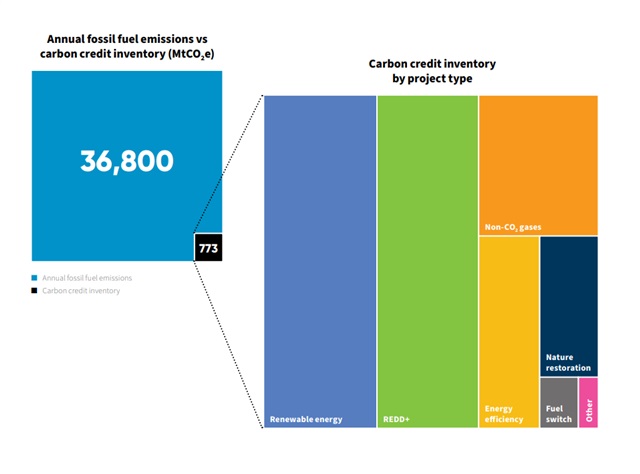Taiwan is making significant strides towards its net-zero emissions goal by implementing a comprehensive carbon pricing mechanism. At a recent forum, officials and industry experts highlighted the country's efforts in advancing its carbon market through strategic partnerships and regulatory updates. Key announcements included the launch of innovative carbon credit projects and updates on Taiwan's integration with international carbon pricing mechanisms.
Carbon pricing, whether through carbon taxes or emissions trading systems (ETS), plays a crucial role in cutting emissions and promoting low-emission development. At present, there are 75 carbon tax and ETS initiatives active globally. In Asia, Japan, South Korea, Singapore, and China have already implemented these systems. Meanwhile, Thailand, Vietnam, Indonesia, and Malaysia are in the process of planning their implementation.
Prices and coverage across ETSs and carbon taxes, as of April 1, 2024

Credit: World Bank
Taiwan is closely monitoring the development of the EU's Carbon Border Adjustment Mechanism (CBAM), which is set to implement carbon levies on imported goods starting in 2026. Steel industry is particularly vulnerable to these changes. The Clean Competition Act, introduced by the US Senate and dubbed the American version of CBAM, will require US Customs to start collecting carbon tariffs immediately from 2024, without any transition period, once it is enacted into law
Taiwan's Ministry of Environment recently releases three drafts of the carbon fee regulations. Addressing the evolving landscape of carbon pricing, Huang Wei-Ming, Deputy Director-General of the Climate Change Administration, underscored Taiwan's strategy to implement a carbon fee system, initially focusing on economic incentives rather than as a fiscal tool. The goal is to achieve emission reductions through a phased approach, aiming for substantial progress by 2030. The system incorporates a risk coefficient for carbon leakage industries, drawing parallels to the CBAM regulations, which will fully phase out free allowances by 2034.
"Taiwan's carbon pricing policy is designed to cover approximately 50% of the nation's emissions, encouraging a broader range of participants, including smaller emitters," Huang noted. The policy includes incentives for voluntary reduction plans and applies different rates based on the risk of carbon leakage, thereby promoting compliance and innovation in emission reductions. The carbon fee revenues will be managed by a dedicated fund, with plans to reinvest in low-carbon technology research and development, as well as support for a just transition for impacted industries.
The carbon price levels and the coverage of the applied carbon taxes and ETS

Credit: World Bank
Jennifer Wang, Executive Vice President at TÜV Rheinland Taiwan, emphasized the urgency for companies to decarbonize, citing the potential costs of carbon taxes, reputational risks, and supply chain requirements from major brands. "The key for companies is to quantify their emissions through carbon footprinting, implement reduction measures supported by government incentives and green finance, and continuously verify their progress," Wang advised. She highlighted that reducing carbon emissions entails significant costs, which vary depending on the measures implemented. Both carbon taxes on exported products and domestic carbon fees contribute to these costs, necessitating accelerated carbon reduction efforts by businesses.
The importance of green energy availability for maintaining industrial competitiveness was also emphasized. Taiwan's government supports this through substantial subsidies, including multi-billion-dollar programs to aid enterprises in obtaining third-party certifications such as those offered by TÜV Rheinland. "Over 1,500 Taiwanese companies have adopted Science-Based Targets Initiative (SBTI) goals. Those meeting SBTI requirements could benefit from significantly reduced carbon fees, potentially up to a 50% discount," highlighted Sammy Su, Head of Sustainability Strategy at TÜV Rheinland Taiwan. This initiative aligns Taiwan's carbon pricing mechanisms with global standards, ensuring compliance and competitiveness in international markets.

Credit: Bloomberg
Joshua Tien, CEO of the Taiwan Carbon Solution Exchange (TCX), highlighted the growing market for voluntary carbon credits. TCX has partnered with Verra, an international carbon certification body, to offer nature-based carbon removal projects. The Myanmar Mangrove Blue Carbon Project, launched on June 13, is TCX's first nature-based and carbon dioxide removal initiative. Research indicates that mangroves can sequester carbon at rates three to five times higher than tropical forests, enhancing both carbon reduction and biodiversity.
As the world moves towards net-zero emissions, Taiwan's carbon pricing scheme represents a crucial step in supporting its industries' competitiveness while contributing to global climate action.




